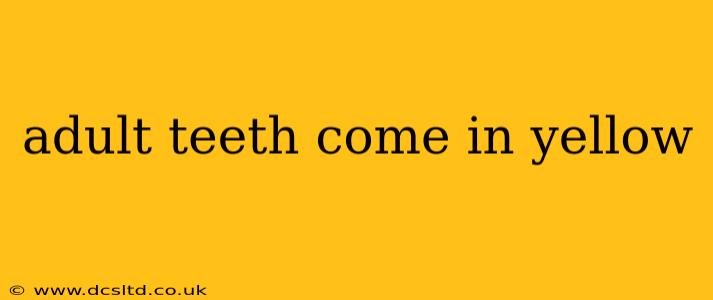Many adults find themselves concerned when their newly emerged adult teeth appear yellow. While perfectly white teeth are often portrayed in media, a slight yellowish hue is actually quite common and, in many cases, perfectly normal. This article will explore the reasons why adult teeth might appear yellow, offering insights into the causes and potential solutions.
Why Do My Adult Teeth Look Yellow?
The color of your teeth is determined by several factors, and it's important to understand that a certain degree of yellowing is natural. The underlying dentin, the layer of tooth beneath the enamel, is naturally yellowish. The enamel, which is the outer layer, is translucent, allowing the dentin's color to show through. The thicker and more translucent your enamel, the whiter your teeth will appear. As we age, the enamel can thin, making the yellow dentin more visible.
Are Yellow Teeth a Sign of Poor Oral Hygiene?
While poor oral hygiene can contribute to yellowing, it's not the sole cause. Yellowing can result from various factors, including:
- Genetics: The thickness and translucency of your enamel are largely determined by your genes. Some individuals naturally have thinner enamel, resulting in more visible yellow dentin.
- Age: As mentioned earlier, enamel tends to thin with age, increasing the visibility of the yellow dentin.
- Diet and Lifestyle: Certain foods and drinks, such as coffee, tea, red wine, and berries, can stain teeth over time. Smoking also significantly contributes to tooth discoloration.
- Medications: Some medications can cause tooth discoloration as a side effect. Tetracycline antibiotics, for instance, are known to stain developing teeth.
- Trauma: Injury to a tooth can sometimes lead to discoloration.
How Can I Whiten My Yellow Adult Teeth?
There are several options available for whitening teeth, ranging from home remedies to professional treatments:
- Over-the-counter whitening products: These include whitening toothpastes, strips, and rinses. These products typically contain bleaching agents that help remove surface stains.
- Professional whitening: A dentist can provide more powerful whitening treatments, such as in-office bleaching or custom-made trays for at-home bleaching. These methods are generally more effective than over-the-counter options.
- Dental bonding and veneers: For more severe discoloration or chipped teeth, a dentist might recommend bonding or veneers to improve the appearance of the teeth.
What Are the Risks Associated with Teeth Whitening?
While generally safe, teeth whitening treatments can have some potential side effects. These can include tooth sensitivity, gum irritation, and enamel erosion if done improperly or excessively. It's crucial to consult a dentist before undertaking any whitening treatment to assess your individual needs and risks.
Can Yellow Teeth Be a Sign of a Serious Medical Condition?
In most cases, yellow teeth are a cosmetic concern and not an indication of a serious underlying medical issue. However, significant or sudden discoloration can sometimes be a symptom of other problems. It's always best to consult a dentist if you notice any unusual changes in your teeth's appearance. They can perform a thorough examination to rule out any underlying health concerns.
How Often Should I See a Dentist for a Checkup?
Regular dental checkups are vital for maintaining good oral health and catching any potential problems early. Most dentists recommend visiting at least twice a year for checkups and cleanings.
Is it Normal for My Adult Teeth to Be Slightly Yellow?
Yes, it is perfectly normal for adult teeth to have a slight yellowish hue. The extent of yellowing varies significantly between individuals, depending on the factors mentioned earlier. Only significant or sudden discoloration warrants concern.
This information is for general knowledge and informational purposes only, and does not constitute medical advice. It is essential to consult a qualified dental professional for any concerns about your teeth or oral health.
